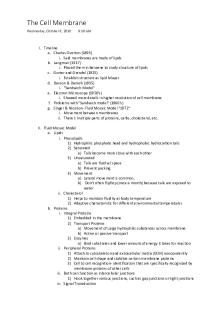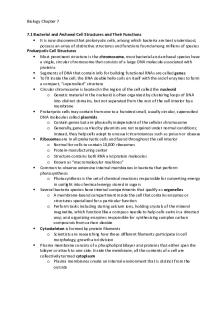The Clara Cell PDF

| Title | The Clara Cell |
|---|---|
| Author | Carlos Ortiz |
| Course | Human Development And Growth |
| Institution | The Pennsylvania State University |
| Pages | 6 |
| File Size | 59.2 KB |
| File Type | |
| Total Downloads | 49 |
| Total Views | 137 |
Summary
All about the Clara Cell...
Description
Running Head: THE ETHICS OF THE CLARA CELL
The Ethics of the Clara Cell Carlos Alberto Ortiz Jr. Southern New Hampshire University
Ortiz 1
THE ETHICS OF THE CLARA CELL
Ortiz 2
Max Clara investigated The Clara Cell to get more information about the bronchial epithelium, but his ways of getting this information can lead to many ethical concerns. Max Clara is primarily known for his research on his coined term the “Clara cell.” He wanted to research this cell for its sufficiency in healing lung disease. During the time of World War II, Max Clara was a supporter of the Nazir Regime which allowed him to get executed prisoners for him to study for “The Clara Cell.” Many of his tissues gathered were based on Jewish prisoners that were held against their will. He took advantage of these prisoners and did many tests with them that would not be allowed by the APA code of ethics. The Nazi Regime allowed this unethical practice at the time because executed prisoners were not viewed the same as regular people. Therefore, we will look at how unethical Max Clara practices were if the APA code of ethics were in place during World War II. Max Clara did not have respect for people’s rights and dignity. Those prisoners were mistreated illegal just to be used as a “guinea pig” for Max Clara cell research (Winkeismann & Noack, 2010). Therefore, Max Clara violated many ethical principles. For starters, he did not practice avoiding harm for the prisoner. Even though Clara did not physically harm them, he still advocated for the bodies for the use of researcher purposed. Therefore, he had the intention of harming the prisoner (Winkeismann & Noack, 2010). Also, he still knew that those individuals were subjugated to torture and still used them for research purpose, therefore, causing harm mentally to the people who knew the executed prisoner. Clara ways of obtaining these individuals by taking advantage of the growing number of executions are unethical in many ways. Clara even failed to get consent from the individuals before their death or even a close relative after their death. According to Winkeismann & Noack (2010), Clara even administered “on at least one of the prisoners before execution,” therefore, he even did not ask to achieve
THE ETHICS OF THE CLARA CELL
Ortiz 3
informed consent while the prisoner was still alive participating in his research. To explain, under Section Eight, Research and Publication, Clara did not ask the executed prisoners before their death for informed consent to research on their bodies, Clara wanted to research on these individuals no matter of any moral dilemma. Max Clara conducted unfair discrimination against the executed prisoners. He was supporting the use of these prisoners as research tools and discriminated against their race because he was an outspoken Nazi. According to the American Psychological Association, 2017) while conducting research individuals may not “engage in unfair discrimination based on …. race, ethnicity, culture, national origin, (or) religion.” Clara was an outspoken Nazi and supporter many of the issues the Nazir regime believes such as discrimination against the Jewish culture. He used the current policy views and discriminated the prisoners in his research. Mac Clara method of obtaining these executed prisoners would not be acceptable in the postworld war II area. To explain, with the APA code of ethics in place researchers now have a standard to which we can conduct studies on individuals. Researchers would not even attempt to collect studies in this manner since they would not even be able to publish their findings. However, during World War II Max Clara was all on these unethical researches since it was beneficial to his findings. He took advantage of the current period and collect samples unethically. According to Winelmann and Noack (2010), he wanted those bodies and fought for them by extending laws to allow him to keep testing on those prisoners. He was not concerned over the welfare of the prisoners, he wanted more laws to execute them for his findings. The central ethical conflict in the Clara Cell case is the violation of Justice through the APA code of ethics. All individuals participating in research h should benefit through psychology standards. Therefore, Clara should not want executed bodies since those people were tortured
THE ETHICS OF THE CLARA CELL
Ortiz 4
and not benefiting from the Nazi Regime. He did not even consider his biases and limitation; therefore, it leads to injustice research of unethical gain. According to the Association of psychology, (2017), Principle D states that “Psychologists exercise reasonable judgment ...” Clara judgment was swayed by the Nazir regime, and he did not gather the thought that using prisoners killed unjustly for research violated ethical moralities. The Nazir regime was considered a pretense to justice; therefore, all his practice will be considered against the APA code of ethics. Clara did not have any integrity or dignity for these executed prisoners, and his only objective was to research “The Clara Cell” because at the time Nazir Germany did not view the prisoners as people. Therefore, Clara did not “respect and protect civil and human expression in research, teaching, and publication (Association of Psychologist, 2017). He viewed these prisoners as beneath himself and only cared to gathered data. Therefore, he did not honor the APA code of ethics by respecting the prisoner’s judgment. To respect individuals, researchers must give inform consent, not discrimination based on their race, and practice avoiding harm. His relationship with the individual was mainly a “cadaver” for research. To explain, Clara wanted these bodies no matter what cause for his gain because he “actively stretched the legal limits of cadaver use, in cooperation with the legal authorities (Winelmann & Noack 2010). If Clara were still subjected to the APA code of ethics, he would have been revoked of his license for unethical research against individuals. However, analyzing his past actions today and making moral judgment lead to ethical implication. Clara did not understand the ethics of his experimentation. Therefore, he was only administering what he thought was correct by his standards. To subjugate him as a violator of ethical code can lead to implication since ethics did not practice in Nazi Germany. However, Clara should understand that those individuals are
THE ETHICS OF THE CLARA CELL
Ortiz 5
people regardless of their status as prisoners to the Nazi Regime. Clara did not care about those, and that is unethical in many ways.
THE ETHICS OF THE CLARA CELL
Ortiz 6
References American Psychological Association (Ed.). (2017, January 1). Ethical principles of psychologists and code of conduct. retrieved October 20, 2018, from https://www.apa.org/ethics/code/ Winkelmann, A., & Noack, T. (2010, October). The clara cell: A "third reich eponym"? european respiratory journal, vol. 36, no. 4, Nov. 2010, pp. 722–727., Retrieved October 20, 2018. doi: 10.1183/09031936.00146609.Retrieved October 20, 2018....
Similar Free PDFs

The Clara Cell
- 6 Pages

Resumen Clara Nicol - jkbb
- 2 Pages

Clara Campoamor
- 2 Pages

The cell cycle lecture
- 3 Pages

The Cell Membrane
- 2 Pages

Clara Campoamor preguntas
- 2 Pages

The Cell Cycle II Meiosis
- 1 Pages

Chapter 7: Inside the Cell
- 10 Pages

B02 - The Cell Cycle - pdf
- 14 Pages

Ch 7 - Inside the Cell
- 7 Pages

The Eukaryotic Cell Cycle-1
- 1 Pages

Assignment 7 the cell factory
- 18 Pages

Cell mitosis - cell mitotsis
- 4 Pages

Direito de Visita - Maria Clara Reis
- 13 Pages
Popular Institutions
- Tinajero National High School - Annex
- Politeknik Caltex Riau
- Yokohama City University
- SGT University
- University of Al-Qadisiyah
- Divine Word College of Vigan
- Techniek College Rotterdam
- Universidade de Santiago
- Universiti Teknologi MARA Cawangan Johor Kampus Pasir Gudang
- Poltekkes Kemenkes Yogyakarta
- Baguio City National High School
- Colegio san marcos
- preparatoria uno
- Centro de Bachillerato Tecnológico Industrial y de Servicios No. 107
- Dalian Maritime University
- Quang Trung Secondary School
- Colegio Tecnológico en Informática
- Corporación Regional de Educación Superior
- Grupo CEDVA
- Dar Al Uloom University
- Centro de Estudios Preuniversitarios de la Universidad Nacional de Ingeniería
- 上智大学
- Aakash International School, Nuna Majara
- San Felipe Neri Catholic School
- Kang Chiao International School - New Taipei City
- Misamis Occidental National High School
- Institución Educativa Escuela Normal Juan Ladrilleros
- Kolehiyo ng Pantukan
- Batanes State College
- Instituto Continental
- Sekolah Menengah Kejuruan Kesehatan Kaltara (Tarakan)
- Colegio de La Inmaculada Concepcion - Cebu

